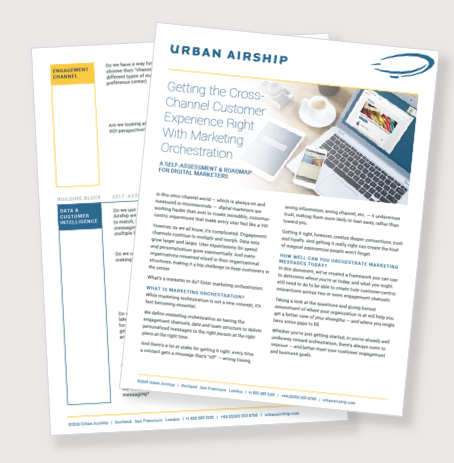
Marketing Orchestration: 17 Questions Every Digital Marketer Should Ask

Share to my network
In this article
Categories
Book a meeting
Connect with our team of experts to discuss your conversion and loyalty goals, and how we can help you achieve them faster.
Get a demoWhile marketing orchestration is not a new concept, it’s fast becoming essential. We define marketing orchestration as having the engagement channels, data and team structure to deliver personalized messages to the right person at the right place at the right time.
However, as we all know, it’s complicated. Engagement channels continue to multiply and morph. Data sets grow larger and larger. User expectations for speed and personalization grow exponentially. And many organizations remained siloed in their organizational structures, making it a big challenge to keep customers in the center.
But there are ways through the maze. To help, we’ve put together a self-assessment and roadmap to help you determine where you’re at today and what you might need to do to create truly customer-centric interactions across your engagement channels.
Download the full whitepaper for all 17 questions — along with advice from our strategy experts on considerations — for each one anytime!
Here are three of the questions to get you started:
From the Engagement Channel Readiness Question Set:
Are some or all of the channels we use to engage our contacts connected in any way (common data sets, same UI, etc.) today — and if so, how?
It can be helpful to map out the flow for how your engagement channels are (or are not) connected today. For example, where they live in your martech stack, where data lives for each channel, etc.
From the Data & Customer Intelligence Readiness Question Set:
Do we have a data warehouse, data lake or some other shared repository for our data — and how easy is it to get data in and out of it for analysis and fast decision-making?
Your data is valuable to executive decision makers, product managers, marketers crafting communications and many others. Easy access to data and intelligence across channels and the customer journey increases your collective chances for improvements.
From the Team Structure Readiness Question Set:
How much access do we have to development resources — and how hard is it/how long does it take to get their time?
When it comes to team structure, if implementation and technical maintenance resources are in short supply, planning becomes even more important. Consider developing a quarterly roadmap that includes maintenance as well an enhancement component to keep everyone on the same page. And evaluate other options: ask partners what development and implementation services they can offer.
Get the Full Self-Assessment White Paper
Our full guide — Getting the Cross-Channel Customer Experience Right With Marketing Orchestration — includes building blocks we recommend having in place, 17 self-assessment questions to help you and your team identify gaps, plus opportunities and next steps to help you start orchestrating your marketing messaging to create incredible customer experiences. Download your copy today!

